A brief overview of some issues included in the new bill prepared by the Spanish Government
Until next December 17, 2022, the date on which one year will have passed since the entry into force of the Directive known as “Whistleblowing”, we will take a brief look at some issues included in the new bill prepared by the Government Spanish, published in the Official Gazette of the Cortes Generales on September 23, 2022, to transpose the European Directive whose purpose is to protect all those people who report on corruption, fraud and violations of European Union Law and the internal legal system and to whom you can access from here.
What has been done in this time, since the entry into force of the European Directive by companies, mainly with 250 or more workers, as these are the first obliged to implement a Whistleblowing Channel in their organizational structure, is not small, even more so We take into account the complexity of the matter. For their part, those companies with fewer staff, specifically between 50 and 249 workers, are already preparing for this, although they still have room to comply with this obligation: December 17, 2023. And they do no harm in having put their hands together. to the work.

The channels implemented so far meet the requirements that the Directive itself recommends so that all complaints or communications that are channeled through said channel are correctly managed. All of this, above all, with a clear objective, to keep protected the identity of the people affected by such communications or complaints and, therefore, their fundamental rights.
Tools
There are many technological tools developed for this purpose, aimed at guaranteeing confidentiality while complying with the most demanding security standards (ENS, ISO...), these programs, easy to implement and manage, prepare information and statistical reports. as dashboards, which facilitates the management of the ethical channel. However, we cannot lose sight of the main thing and this is the action of inform, communicate or denounce.
To achieve this, we must all participate in the creation of reliable, protected work environments that guarantee our fundamental rights and, above all, respect them. The technological platforms applied to the complaints channel do not do everything. By becoming aware of this, only then can we understand what lies behind a decision to “report or inform.”

We must, therefore, focus on what is really important about the issue: reporting. Deciding something like this shouldn't be easy, so empathizing with someone who might find themselves in a situation like this should be an exercise that we all have to practice to put ourselves in the situation.
What better way to do it than in the case of a hypothetical and not real case?
If you found this article interesting, you are in good news! Next December 20 at 6:30 p.m. we will celebrate a new EIP Talks in which we will delve deeper into the “Whistleblowing” Directive and its implications along with Carlos Tauroni, Compliance specialist consultant.





































